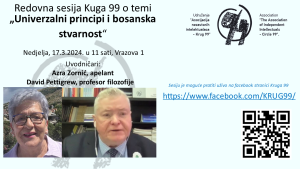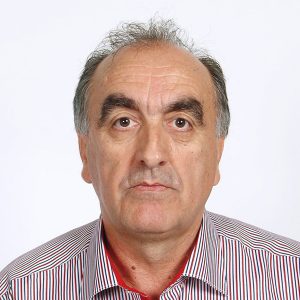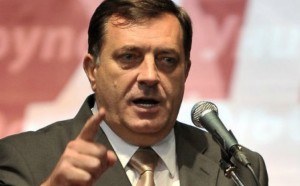Roots of the Joint Criminal Enterprises and Genocide in the Ongoing Bosnian Coup

| Krug 99 (Circle 99), 4 July 2023 – 36 Sarajevo, Bosna and Herzegovina Roots of the Joint Criminal Enterprises and Genocide in the Ongoing Bosnian Coup The failure of the OHR to implement a comprehensive transitional justice program supporting memorialization and prosecuting denial and hate speech has, no doubt, been part of what has led us to the current crisis in Bosnia and Herzegovina. This inaction is part of a tragic pattern of leniency and appeasement. The international community has consistently failed to confront such nationalist or secessionist provocations. Milorad Dodik, for his part, recently made his effort to undermine the state by seeking to render Bosnia’s Constitutional Court nonfunctional. In addition, the Assembly of Republika Srpska voted to ignore decisions made by the High Representative and to suspend decisions of the Constitutional Court. With these steps Mr. Dodik and Republika Srpska have declared themselves above the law and have sought to drive another wedge between the State of Bosnia and Herzegovina and the entity of Republika Srpska in pursuit of the goal of secession. Having presented Putin with the “Order of Republika Srpska” in January, Mr. Dodik continued his fealty to the Russian dictator by making yet another visit to Moscow. In this way, Mr. Dodik clearly intends to insult the EU and NATO. Yet apart from a few verbal condemnations, there has been almost no concrete response to Dodik’s anti-Dayton and unconstitutional actions. His actions confirm that Republika Srpska is a renegade entity as he acts with impunity. The High Representative’s limited decisions on July 1st in response to the RS Assembly were, one could say, “too little, too late”. The international community needs to recognize with greater urgency that the revisionist Croatian Defense Council (HVO) museum in Mostar, and the anti-State activities of Milorad Dodik, are nothing less than a continuation of the territorial and eliminationist goals of a “Greater Croatia and a “Greater Serbia” from the 1990s. The ICTY found that heinous war crimes were committed by HVO at the Heliodrom concentration camp. A museum commemorating or honoring the HVO on the site of the camp is simply inconceivable. It is an affront to human decency. As Dr. Esad Boškailo, a prisoner of six concentration camps in Herzegovina has emphasized, it is as if a museum honoring the German Wehrmacht or the S.S. (Schutzstaffel) would be installed at a former Nazi concentration camp. Let us recall that the atrocities committed by the HVO took place under the auspices of a Joint Criminal Enterprise that was designed to connect Croatia to the self-declared “Herceg-Bosna” within Bosnia, and thereby achieve a “Greater Croatia.” That goal was echoed in the recent document of the Croatian Academy of Sciences and Arts that called for the creation of a third entity in Bosnia; a Bosnian Croat entity. Mr. Dodik’s anti-state and secessionist activities are clearly in service of “Republika Srpska” as a realization of “Greater Serbia.” Indeed, the Appeals Chamber judgement in the Stanišić and Simatović case confirmed the goal of a Joint Criminal Enterprise originating in Belgrade with the goal of permanently removing non-Serbs from large areas of Bosnia. All these findings underline the nature of the international aggression that originated from Belgrade and Zagreb in the 1990s. Bosnia and Herzegovina now faces increasing instability as a result of the international community’s unwillingness to confront these nationalist ideologies and territorial ambitions As we approach the commemoration of the Srebrenica genocide the High Representative needs to undertake comprehensive transitional justice initiatives to prevent the glorification of war criminals, support memorialization according to the normative guidelines established by United Nations and human rights documents, prosecute hate speech and genocide denial according to EU jurisprudence and to Bosnia’s own laws. The Mothers of Srebrenica and other survivors deserve our full support in their efforts to seek reparations from Serbia following the Appeals Chamber Judgement in the case of Stanišić and Simatović The construction of the Heliodrom Museum for HVO must be stopped. Instead of a memorial at Heliodrom for the perpetrators, the Office of the High Representative should oversee the installation of memorial plaque for the victims and ensure the right to a commemorative gathering for survivors. The OHR should also oversee the installation of plaques and memorial museums at Barutni Magacin in Kalinovik, “Partizan” Sports Hall in Foča, as well as at Omarska, Trnopolje, Kravica Warehouse, Pilica Cultural Center, among other sites. The leaders behind those secessionist initiatives should be sanctioned and temporarily banned from public office as has been done in the past. Further, Mr. Dodik’s genocide denial, his cursing the Srebrenica genocide and his hate speech, must be prosecuted by the appropriate authorities. Genocide denial and hate speech must be prosecuted in order to restore the rule of law, prevent re-traumatization of survivors, and prevent a repetition of the atrocities. This is fundamental in a post-genocide society. In order to expedite membership in the EU the judgements of the European Court of Human Rights (ECtHR) must be implemented in BiH. The Court has insisted that the concept of “constituent peoples” is discriminatory and obsolete, and that “democratic arrangements should be made without further delay.” *** Summary of Session of 18 June 2023, Professor Doctor prof. dr. David Pettigrew, Professor of Philosophy, and Holocaust and Genocide Studies, Southern Connecticut State University, Member, Steering Committee Yale University Genocide Studies Program; Emir Hajdarovic, President of the Association of Concentration Camp Survivors in the City of Mostar; Edin Batlak., President of the Steering Board of the Association of Concentration Camp Survivors in the City of Mostar Adil Kulenović, President |
| Association of Independent Intellectuals – Circle 99 (Bosnian: Krug 99), a leading Bosnian think-tank, was established in Sarajevo in 1993, in the midst of the Bosnian war (1992-1995), while the capital was under siege. Circle 99 provides a platform to bring together intellectuals of various professional and ethnic identities; university professors, members of the Academy of Sciences and Arts of Bosnia and Herzegovina, artists, journalists, entrepreneurs, diplomats, and other prominent figures from Bosnia and from abroad. Multidisciplinary discussions and initiatives are held each Sunday throughout the academic year, in the form of regular sessions about politics, science, education, culture, economy, and other societal issues. The overall goal is to sensitize the public towards a democratic transformation, achieving and maintaining peace, and integration of modern Bosnia into the community of countries fostering liberal democracy. Circle 99 has been declared an organization of special significance for the city of Sarajevo. |







